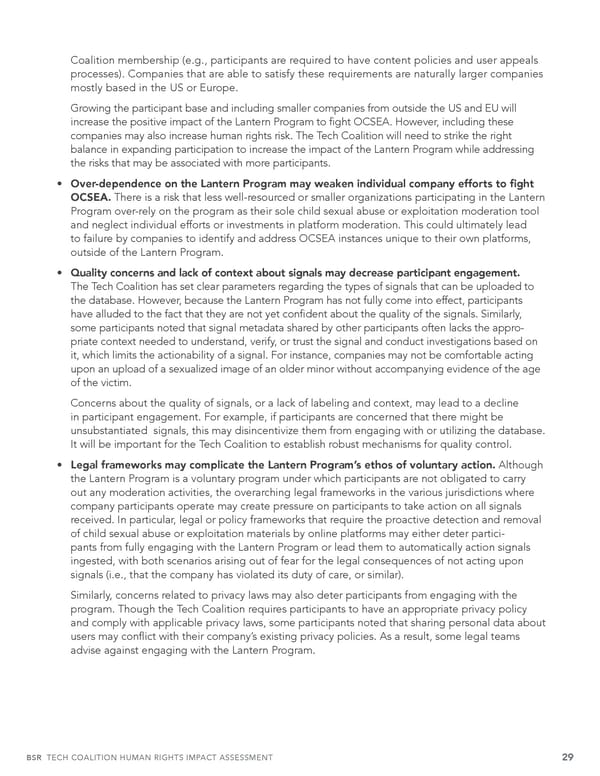Coalition membership (e.g., participants are required to have content policies and user appeals processes). Companies that are able to satisfy these requirements are naturally larger companies mostly based in the US or Europe. Growing the participant base and including smaller companies from outside the US and EU will increase the positive impact of the Lantern Program to 昀椀ght OCSEA. However, including these companies may also increase human rights risk. The Tech Coalition will need to strike the right balance in expanding participation to increase the impact of the Lantern Program while addressing the risks that may be associated with more participants. • Over-dependence on the Lantern Program may weaken individual company efforts to 昀椀ght OCSEA. There is a risk that less well-resourced or smaller organizations participating in the Lantern Program over-rely on the program as their sole child sexual abuse or exploitation moderation tool and neglect individual efforts or investments in platform moderation. This could ultimately lead to failure by companies to identify and address OCSEA instances unique to their own platforms, outside of the Lantern Program. • Quality concerns and lack of context about signals may decrease participant engagement. The Tech Coalition has set clear parameters regarding the types of signals that can be uploaded to the database. However, because the Lantern Program has not fully come into effect, participants have alluded to the fact that they are not yet con昀椀dent about the quality of the signals. Similarly, some participants noted that signal metadata shared by other participants often lacks the appro- priate context needed to understand, verify, or trust the signal and conduct investigations based on it, which limits the actionability of a signal. For instance, companies may not be comfortable acting upon an upload of a sexualized image of an older minor without accompanying evidence of the age of the victim. Concerns about the quality of signals, or a lack of labeling and context, may lead to a decline in participant engagement. For example, if participants are concerned that there might be unsubstantiated signals, this may disincentivize them from engaging with or utilizing the database. It will be important for the Tech Coalition to establish robust mechanisms for quality control. • Legal frameworks may complicate the Lantern Program’s ethos of voluntary action. Although the Lantern Program is a voluntary program under which participants are not obligated to carry out any moderation activities, the overarching legal frameworks in the various jurisdictions where company participants operate may create pressure on participants to take action on all signals received. In particular, legal or policy frameworks that require the proactive detection and removal of child sexual abuse or exploitation materials by online platforms may either deter partici- pants from fully engaging with the Lantern Program or lead them to automatically action signals ingested, with both scenarios arising out of fear for the legal consequences of not acting upon signals (i.e., that the company has violated its duty of care, or similar). Similarly, concerns related to privacy laws may also deter participants from engaging with the program. Though the Tech Coalition requires participants to have an appropriate privacy policy and comply with applicable privacy laws, some participants noted that sharing personal data about users may con昀氀ict with their company’s existing privacy policies. As a result, some legal teams advise against engaging with the Lantern Program. BSR TECH COALITION HUMAN RIGHTS IMPACT ASSESSMENT 29
 Tech Coalition Human Rights Impact Assessment of the Lantern Program Page 28 Page 30
Tech Coalition Human Rights Impact Assessment of the Lantern Program Page 28 Page 30